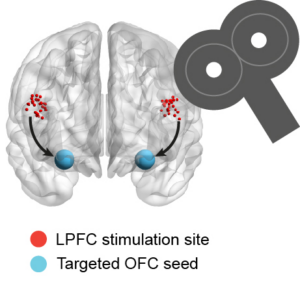 Hot Off the Press – April 10, 2024
Hot Off the Press – April 10, 2024
Published in Nature Communications by Qingfang Liu and Thorsten Kahnt, et al. from the NIDA IRP Learning and Decision-Making Unit.
Summary
In this study, Qingfang Liu (Research Fellow in the LDMU) and colleagues show that identity prediction errors in the dopaminergic midbrain are computed based on outcome expectations encoded in the lateral orbitofrontal cortex (OFC). Specifically, the study used network-targeted transcranial magnetic stimulation (TMS) and functional magnetic resonance imaging (fMRI) to show that disrupting lateral OFC activity increases midbrain responses to identity prediction errors. This suggests that neural representations in the lateral OFC provide the input for the computation of identity prediction errors.
Publication Information
Midbrain signaling of identity prediction errors depends on orbitofrontal cortex networks Journal Article
In: Nat Commun, vol. 15, no. 1, pp. 1704, 2024, ISSN: 2041-1723.
